Sakura Science Program Participants from Indonesia Explore Disaster Nursing at University of Shizuoka
From December 15 to 20, university students and young researchers from Indonesia joined the School of Nursing at the University of Shizuoka to experience a unique disaster nursing program. Their visit was part of the Sakura Science Program, a project organized by the Japan Science and Technology Agency (JST), with the Shizuoka Prefectural Government and the University of Shizuoka collaborating to host this initiative.
December 16: Hands-on Disaster Nursing Seminar
The participants took part in a disaster nursing seminar, a required course for second-year nursing students, at the Oshika Campus gymnasium. Through group exercises simulating disaster scenarios, they learned how community disaster response organizations operate. Ms. Natalie Sami Suzuki, a fourth-year nursing student who provided interpretation and guidance, shared her hopes: “By understanding each term and exchanging ideas during the exercises, I hope the participants will apply what they learned back in their home country.”
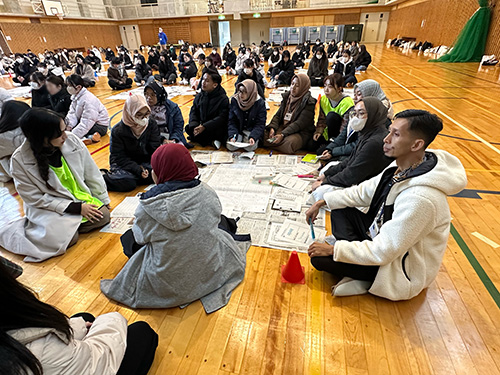
Disaster nursing seminar at Oshika Campus gymnasium.
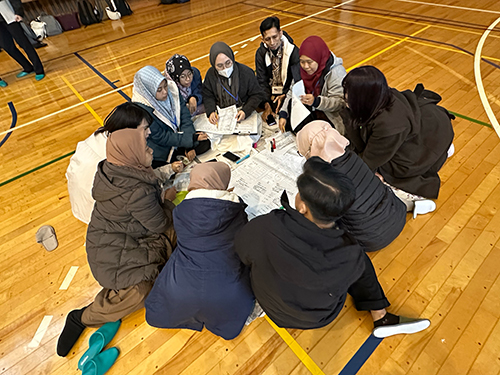
Disaster nursing exercises at Oshika Campus gymnasium.
December 18: Courtesy Visit and Cultural Exchange
The group paid a courtesy visit to President Yasuyuki Imai, reaffirming academic ties with Padjadjaran University and discussing deeper collaborations with the University of Indonesia. President Imai expressed his aspirations, stating, “We aim to strengthen cooperation with Indonesia and achieve mutual growth through disaster nursing.” Participants also enjoyed a traditional tea ceremony exploring the role of Japanese tea in disaster resilience and toured campus facilities with state-of-the-art disaster preparedness features.
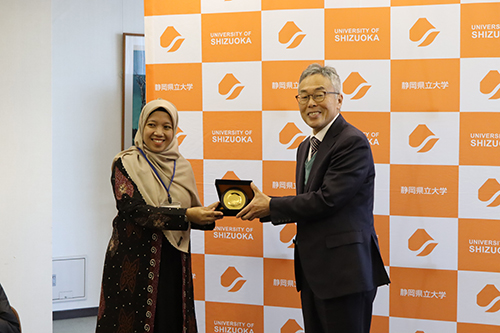
Presenting a gift to President Imai(right) from Padjadjaran University.
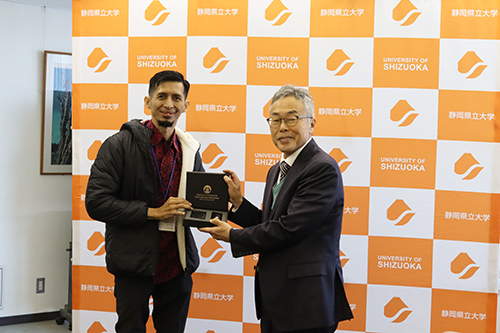
Presenting a gift to President Imai from the University of Indonesia.
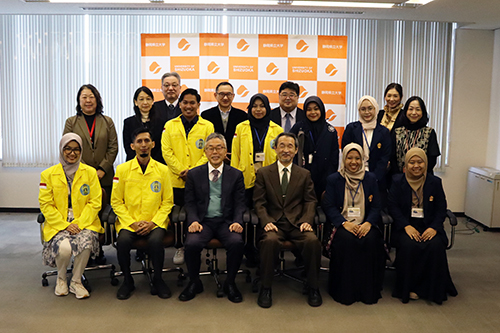
Group photo during the courtesy visit.
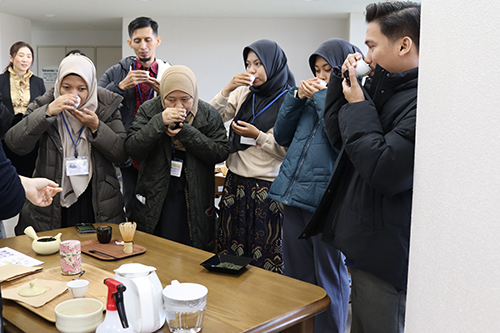
Tea ceremony experience.
December 19: Immersive Learning and Open Dialogue
The morning began with participants touring the Simulation Center and nursing skills labs at the Oshika Campus, where they engaged with faculty members specializing in adult and basic nursing. During the visit, third-year nursing students delivered presentations on maternal and child health initiatives. Ms. Ristina Milwanti, a lecturer from Padjadjaran University, was highly impressed, commenting, “The students demonstrated remarkable critical thinking skills, which are truly commendable.”
Participants also observed the campus's disaster preparedness measures, such as emergency helmets placed throughout the facilities. Mr. Muhammad Ferly Aditiya, a master's student in nursing at the University of Indonesia, remarked, “The campus's well-prepared environment significantly contributes to the high disaster awareness among students and staff.”
In the afternoon, the group participated in an injury prevention activity simulating scenarios where rubble and debris might obstruct pathways during a disaster. The training incorporated judo techniques to help minimize injuries in such hazardous conditions. Nursing students Mr. Tomohiro Ito and Mr. Yuta Hirai, who led the activity, reflected, “It was exciting to see the participants actively engage with the program. We're thrilled that the judo techniques we practice as a sport can also serve a purpose in disaster situations, even internationally.”
Following the training, an open discussion was held focusing on Indonesia's healthcare and education systems. Participants shared insights about their respective institutions, offering valuable perspectives on medical practices and challenges in their country. The session included a lecture by Associate Professor Chisato Suzuki, who shared her experiences from providing relief after the 2004 Sumatra earthquake. Her stories highlighted the challenges of operating without electricity and the resilience required in disaster situations. The lecture deeply resonated with the audience, fostering a sense of solidarity among nursing professionals across cultures.
Professor Suzuki concluded, “Although we come from different countries, I believe we share many commonalities as fellow nursing professionals. These connections can lead to mutual understanding and growth.”
Participants also observed the campus's disaster preparedness measures, such as emergency helmets placed throughout the facilities. Mr. Muhammad Ferly Aditiya, a master's student in nursing at the University of Indonesia, remarked, “The campus's well-prepared environment significantly contributes to the high disaster awareness among students and staff.”
In the afternoon, the group participated in an injury prevention activity simulating scenarios where rubble and debris might obstruct pathways during a disaster. The training incorporated judo techniques to help minimize injuries in such hazardous conditions. Nursing students Mr. Tomohiro Ito and Mr. Yuta Hirai, who led the activity, reflected, “It was exciting to see the participants actively engage with the program. We're thrilled that the judo techniques we practice as a sport can also serve a purpose in disaster situations, even internationally.”
Following the training, an open discussion was held focusing on Indonesia's healthcare and education systems. Participants shared insights about their respective institutions, offering valuable perspectives on medical practices and challenges in their country. The session included a lecture by Associate Professor Chisato Suzuki, who shared her experiences from providing relief after the 2004 Sumatra earthquake. Her stories highlighted the challenges of operating without electricity and the resilience required in disaster situations. The lecture deeply resonated with the audience, fostering a sense of solidarity among nursing professionals across cultures.
Professor Suzuki concluded, “Although we come from different countries, I believe we share many commonalities as fellow nursing professionals. These connections can lead to mutual understanding and growth.”
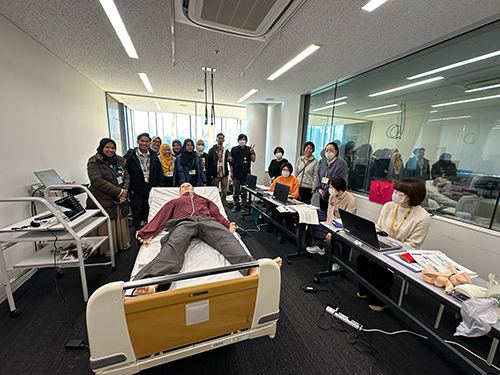
Photo with adult nursing faculty at the Simulation Center.

Photo with 3rd-year nursing students in Lab 3.
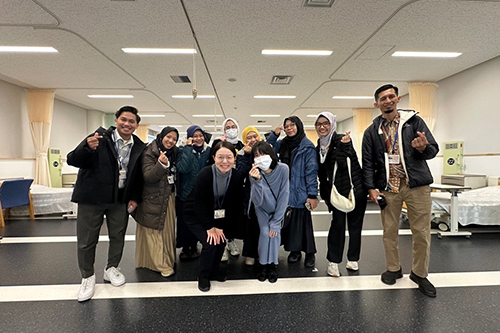
Photo with basic nursing faculty in Lab 1.
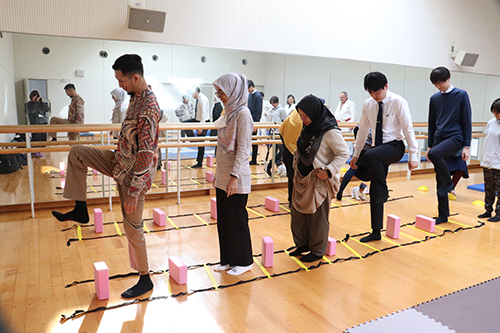
Participants navigating debris during a disaster drill.
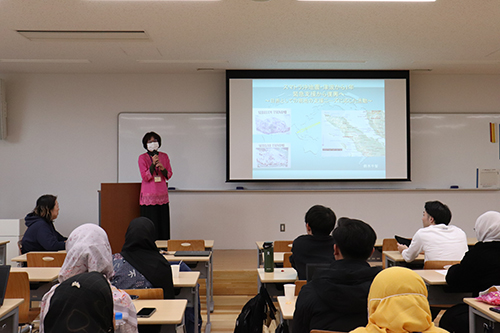
Lecture by Associate Professor Chisato Suzuki.
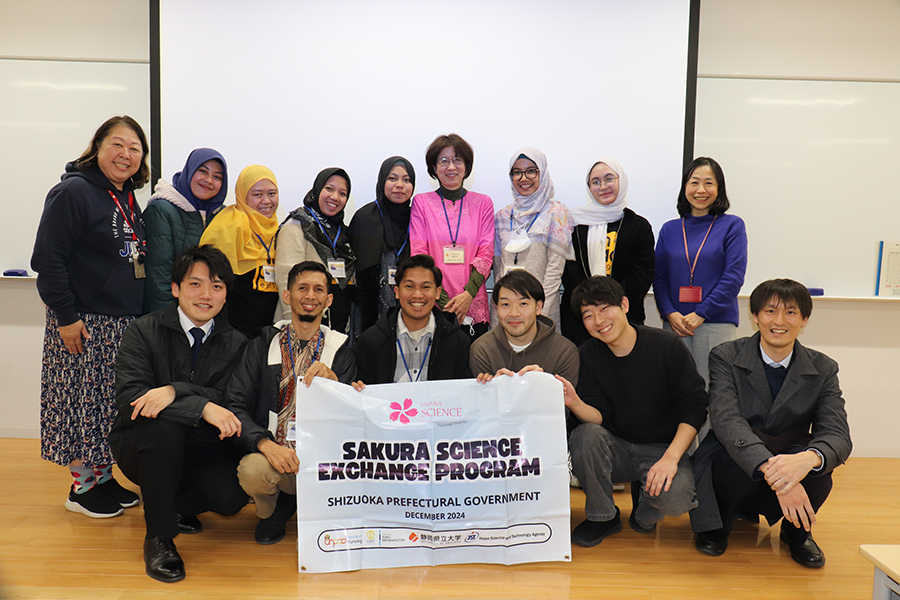
Group photo.
(12/27/2024)


